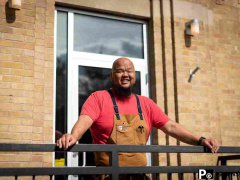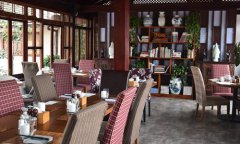
Enlarge this image
Constantine Tsioulcas, holding his daughter Anastasia as a baby. Courtesy of Anastasia Tsioulcas hide caption
toggle caption Courtesy of Anastasia Tsioulcas
Constantine Tsioulcas, holding his daughter Anastasia as a baby.
Courtesy of Anastasia TsioulcasMy father gave me strict instructions: Your single-minded goal must be to coddle the paper-thin, nearly transparent phyllo dough. You need an ample supply of melted butter and some clean, damp kitchen towels stashed right next to you, to use as blankets for the temperamental phyllo. Have your filling already prepared and make sure that you've wrung all the water out of the spinach with yet another towel, or two, or three. (There will be more water than you might think vegetally possible. You will use up many kitchen towels.) Work as quickly as you can, but have no fear.
That's how my father, Constantine Tsioulcas, taught me to make spanakopita, the spinach pie that he grew up eating in Alexandria, Egypt, the city in which he was born and raised.
Our family recipe, carried over generations from Greece to Egypt and back again, calls for individually wrapped triangles that show off multitudinous layers of crisp, flaky pastry; no bricks of greenish sludge for us. The filling, by contrast, is very simple: spinach, some good sharp feta cheese, a touch of freshly grated nutmeg, some lightly sauteed garlic, a little salt and some healthy grinds of pepper, plus those fragile leaves of dough and that unholy amount of butter. That's it. (Technically, this dish should be called spanakotiropita — spinach and cheese pie — but that's a lot of syllables for Americans, as even my father would grudgingly admit.)
Papa guided me in laying out one large, rectangular sheet of phyllo, brushing it with butter, and then swiftly laying another sheet on top. "Hurry up, cover the rest of the phyllo with the towel," he would say, reminding me that the dough would dry out and crack nearly instantaneously if it wasn't covered up again.
We would cut the sheet into three long strips, and brush each ribbon of phyllo dough with melted butter before depositing a bit of filling in one lower corner of the dough. Then we would fold the pie up and over itself again and again in tightly wound triangles, like how soldiers ceremonially fold a flag.
Whenever Papa mixed up a batch of spanakopita filling, he would always say to me, "No eggs! It's not a quiche." But I could hear how he savored the word quiche even as he derided its eggy, earthbound heft. French was his third language; English, his fourth. He loved French; he called himself my papa, following the French way, not baba as we would in either Greek or Arabic.
My mother, an American, had met him by chance in Athens. She was a tourist in her thirties. He was barely past his teens, an aspiring painter who was working as a waiter to help his struggling family; they, like many minority communities in Egypt, had been forced out and had recently settled in Greece's capital, a place that was both theirs and not theirs.
My father's facility with languages became his destiny: On the day he met my mother, Papa was the only waiter on duty who spoke English and so he was assigned to her table. He was instantly smitten, and informed her, "You may think I am merely a waiter, but I am an artist." Somehow – truly, inexplicably – that pickup line worked. She agreed to a quick coffee date before she left the city. Afterward, they corresponded by postcards and letters. Not all that long later, my mother flew again to Athens, this time to marry him.
Right after their wedding, they parted ways for months; she returned to the U.S. without him. During their courtship by postal mail, a military dictatorship had seized power in Greece, and he couldn't leave the country without permission — again finding himself at the mercy of larger political currents in a country he thought he could safely claim as his own. He eventually managed to follow her back to icy, brittle Boston, where the cold, gray Atlantic was nothing like the brilliant seashores he had now left twice over.
Their original notion was to live in the U.S. just a little while, to wait out the junta that had descended upon Greece only a few months before their wedding, and then to move back to Athens. That didn't happen. I was born as their only child a few months before the colonels' rule collapsed, and they decided to stay in this country for the time being. It was a temporary decision that wound up lasting for the rest of his life.









